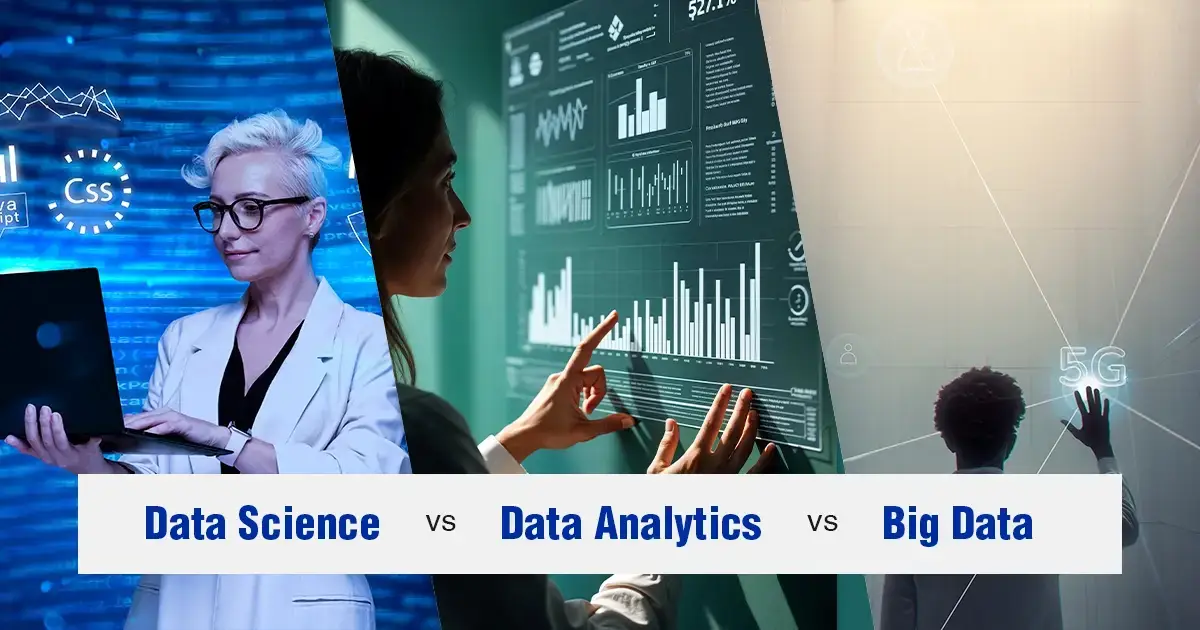FET Blogs


FET Blogs



27 February 2025
Table of Contents:
Technology is evolving rapidly, and the need to manage and analyse data has grown. Although Data Science, Data Analytics, and Big Data sound similar, they serve different purposes. Those planning to build a remarkable career in a data-driven world must know the key differences between Big Data, Data Analytics and Data Science.
Data Science encompasses elements like statistics and programming. It is a field with multiple aspects. Extracting insights from data, Data Science is seen as an indispensable tool for business growth. The upsurge of Artificial Intelligence and Data Science has significantly improved automation and decision-making processes. Many professionals pursue a Master's in Data Science to gain advanced knowledge.
Data analytics examines datasets to identify patterns, trends, and correlations. Unlike data science, which builds predictive models, data analytics uses past and present data. Business analytics and business data analytics help improve strategies and optimise operations. Industries also use business analytics to make informed decisions. While data science is broader, data analytics, like business data analytics, is more specific and often used in finance, healthcare, and retail industries.
Big data refers to massive datasets that traditional methods cannot process. It includes all types of semi-structured, structured and unstructured data. Professionals collect data from different sources such as social media platforms, sensors, etc. The vast amount of data available in various places is essential for companies. Companies use this data to study consumer behaviour and predict market trends. Big data helps businesses identify the choices of their consumers. It also helps companies improve their services and products. The use of Artificial Intelligence and Data Science has deeply impacted the operations, efficiency and decisions of businesses.
Business analytics plays a crucial role in any company's growth. With the help of business analytics, companies use data effectively. Business analytics mainly involves applying data analytics techniques to improve business performance. Companies use business data analytics to gain insights into customer preferences, optimise supply chains, and increase profitability. Big data and big data analytics find great importance in business strategies. They help businesses make better decisions.
Artificial Intelligence and Data Science have transformed industries by enabling automation, predictive analysis, and personalisation. The most crucial benefit of Artificial Intelligence and Data Science is the quick interpretation of massive data. AI-powered tools also help recognise trends. Analysing data and making predictions based on trends helps make intelligent decisions. The advent of big data, Artificial Intelligence, and Data Science has led to innovations in healthcare, finance, marketing, and more.
Pursuing a Master's in Data Science can open doors to advanced opportunities in this rapidly growing field. The career choice in data science, data analytics, and big data mainly depends on individual preferences and passions. For example, data science is the right option for those interested in predictive modelling and AI applications. A career in big data is a suitable choice for those who can manage big amounts of data. Students or individuals who have an eye for details in structured data can consider building a career in data analytics.
Aspirants who wish to make a rewarding career in the latest technologies must know the differences between data science, data analytics, and big data. While these terms overlap in some areas, each has a unique purpose. However, the common fact is that all three help businesses make intelligent decisions. The growing popularity of these technologies suggests brilliant career opportunities for those proficient in data science, data analytics, and big data.
A1: Data scientists analyse challenging datasets. They extract important information from the data and help in decision-making.
A2: Yes, Big Data Analytics is a part of Data Science that focuses on processing and interpreting vast amounts of data.
A3: Yes. Big Data remains highly in demand. Businesses increasingly rely on business analytics for their decisions, predictions and overall growth.
A4: Data Science Engineering involves designing, developing, and optimising data pipelines, algorithms, and systems to process large datasets efficiently.
A5: Data refers to the information that needs analysis. The process of analysing data is called Analytics.
A6: No, they are not the same. Big Data Analytics deals with massive datasets and processing, while Data Analytics focuses on general data analysis, regardless of size.
Popular Post
17 February 2026
AIE Full Form
10 February 2026
AEIE Full Form
22 January 2026
AE Full Form
16 January 2026
What is Aerospace Engineering?
16 January 2026
What is Chemical Engineering?
Ask an Expert for Free